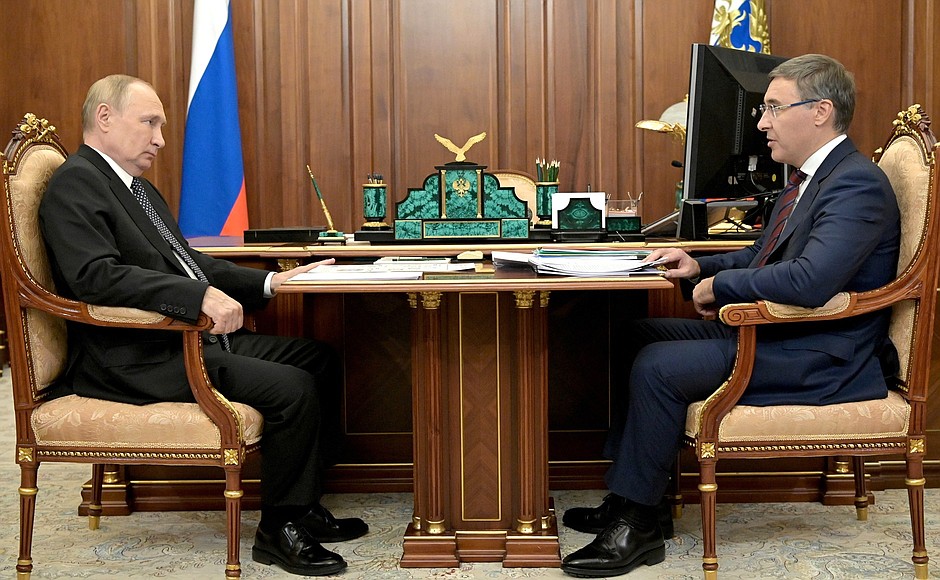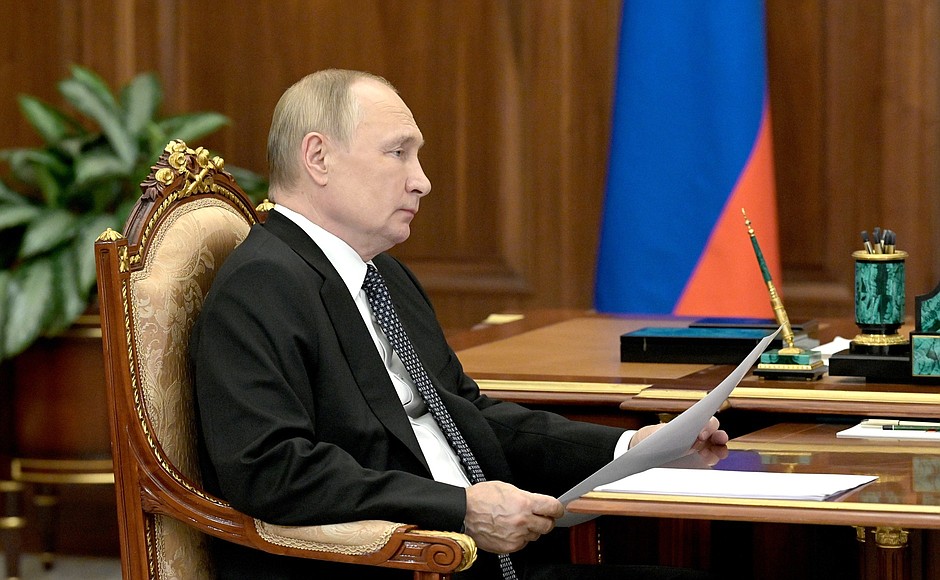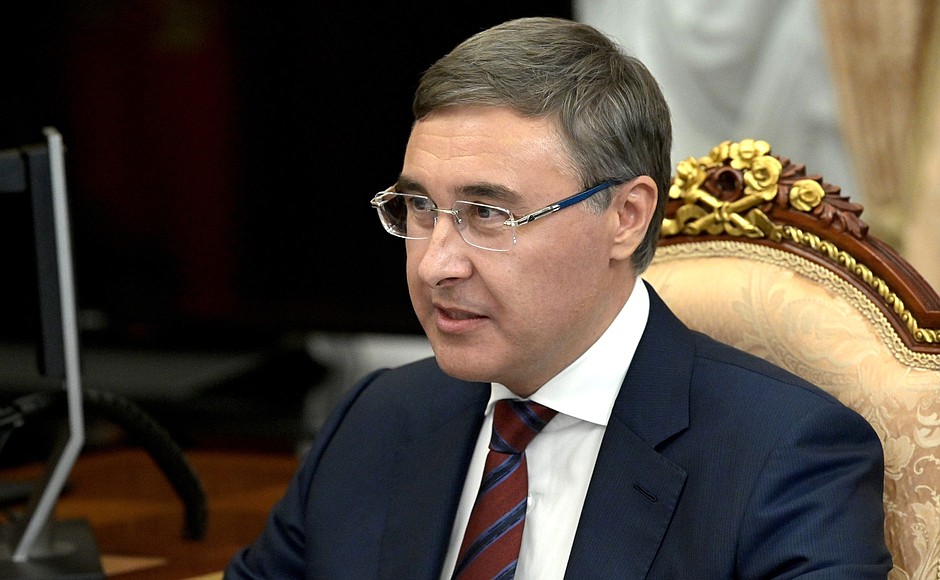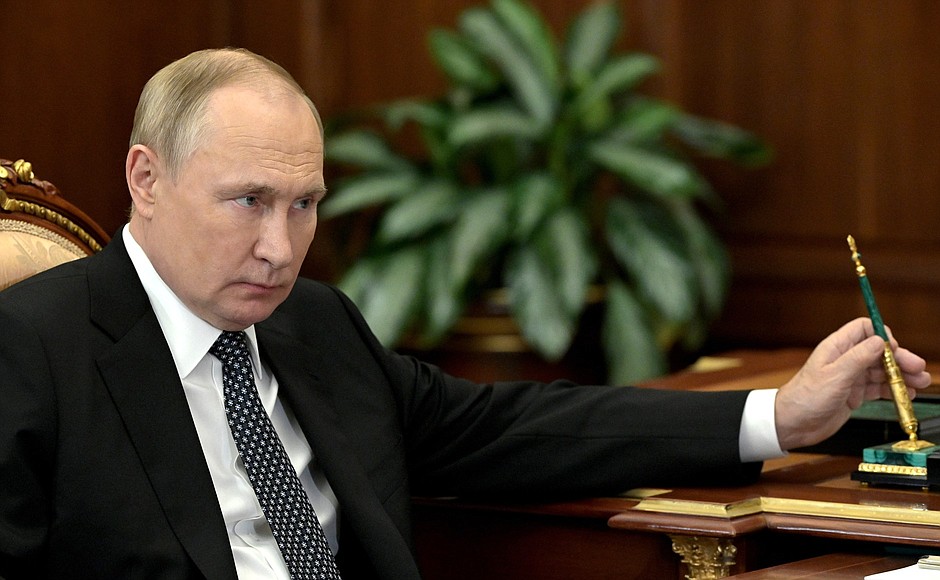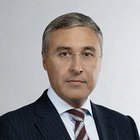President of Russia Vladimir Putin: Mr Falkov, the issue I would like to address and discuss with you is domestic production of research equipment. We have an entire programme dealing with this matter. Could you, please, tell me about the progress and, most importantly, about the production of equipment for civilian purposes.
Minister of Science and Higher Education Valery Falkov: Yes, Mr President.
You gave us respective instructions, and as I promised, I would like to report on our progress today. This programme has been launched, with both the managerial and substantive issues resolved. As for the management, we have designated a specific federal project and have obtained all approvals. This is a project that belongs not only to the Ministry of Economic Development but also to the Finance Ministry and, of course, the Ministry of Industry and Trade. We have formed all the management bodies, determined ten key areas of focus and allocated 12 billion for the next three years.
And this is just the beginning because it is obvious that the programme requires more serious financing, which we will try to provide in the next few years. But right off the top, we chose four major universities: the Moscow Institute of Physics and Technology, the National Research Nuclear University MEPhI, the Bauman Moscow State Technical University and the National Research University of Electronic Technology. We also identified 15 priority positions and allocated almost 1 billion rubles. This work is underway.
I have met with Mr Manturov several times, specifically to discuss this matter. After all, we are not building a museum of prototypes but creating equipment for mainstream use.
Next, Mr President, as you instructed, we are not only working on research equipment but also on devices for study and laboratory work, to be used by Russian universities focusing on physics, chemistry, biology and mathematics. Perhaps maths to a lesser extent but physics, chemistry and biology by all means. And, of course, chemical reagents because without these, lab equipment…
Vladimir Putin: How do you assess the progress?
Valery Falkov: We are off to a good start. Management is fully formed. We have ten major areas of work identified. We have organisations to work with and understand what needs to be done. I believe we will pick up momentum, and this year, we will be able to expand the list of available devices. Of course, it is important to constantly touch base with the scientific community, so to speak, and we do that. I will report to you on a regular basis.
Vladimir Putin: All right.
What else would you like to say?
Valery Falkov: Just a few words. First of all, thank you for announcing the Decade of Science and Technology. You set very specific goals, one of which is to attract young talent to research and development. I would like to tell you briefly about two quite helpful, in my opinion, instruments of government support for youth.
First is the mega-grant programme, which you know, since you were the one who initiated it. I would like to report that the ninth competition for mega-grants was held in 2022, for which 293 applications were received.
What got our attention? That, after all, the demand for this competition once again reaffirmed our openness to scientific cooperation: 293 applications from 44 countries. Finally, we selected 30 winners from 18 countries. And I can say that we did a serious job, everyone was asked, “Are you prepared, despite the possible logistical difficulties here?” Everyone expressed their readiness. Today we are creating similar laboratories and programmes in 13 regions.
Second, Mr President, I have reported to you that we have a goal to create 900 laboratories until 2024. We have already created 500, as you defined, recommended, and instructed us to take a closer look. So, we expedited this effort and created 240 last year. Moreover, we set them up based on the priorities that you identified, like the most important innovation projects. Suppose we have a new medicine – remember, as you pointed out in your Address – we created 35 laboratories for new medicines. Today, microelectronics is extremely relevant.
Vladimir Putin: Where is this?
Valery Falkov: In scientific and education institutes.
Vladimir Putin: In fact, in wide-ranging locations.
Valery Falkov: Yes, across the country; all federal districts were covered. Most of them were created in the Siberian Federal District. Each laboratory costs about 17 million rubles, 10 rates, and they are an excellent tool for attracting young people to science.
Today we have 740 laboratories. Every laboratory means at least 10 jobs for young people, but also an opportunity to express themselves.
And, if I may, I would also like to tell you about one new program. In line with your instructions, together with the Ministry of Education we have implemented a project called University Sessions for schoolchildren from the Donetsk and Lugansk People’s Republics, and the Kherson and Zaporozhye regions.
There were about 14,000 young people in total, of which 10,611 people and 840 mentors went to various regions. This includes 42 universities from 27 regions. Personally, I visited one at Bauman Moscow State Technical University, went there to meet with the young people. It is both an educational and a leisure programme; but it also has a sports module, there is a tour module, because we visited all our cities, saw the universities, and decided, among other things, on the future.
Vladimir Putin: There you can really select children who are enthusiastic, can’t you?
Vladimir Falkov: Of course.
The first and foremost is to discover the genius in every child, in every person.
And the second thing is the bright eyes; sometimes they might not have a lot of knowledge, but if their eyes are bright with interest, then the results can exceed expectations.
Vladimir Putin: You created six modules?
Vladimir Falkov: Yes, we have completed six modules.
It seems to me a good experience in career guidance and education, and a way to see our great country.
<…>
